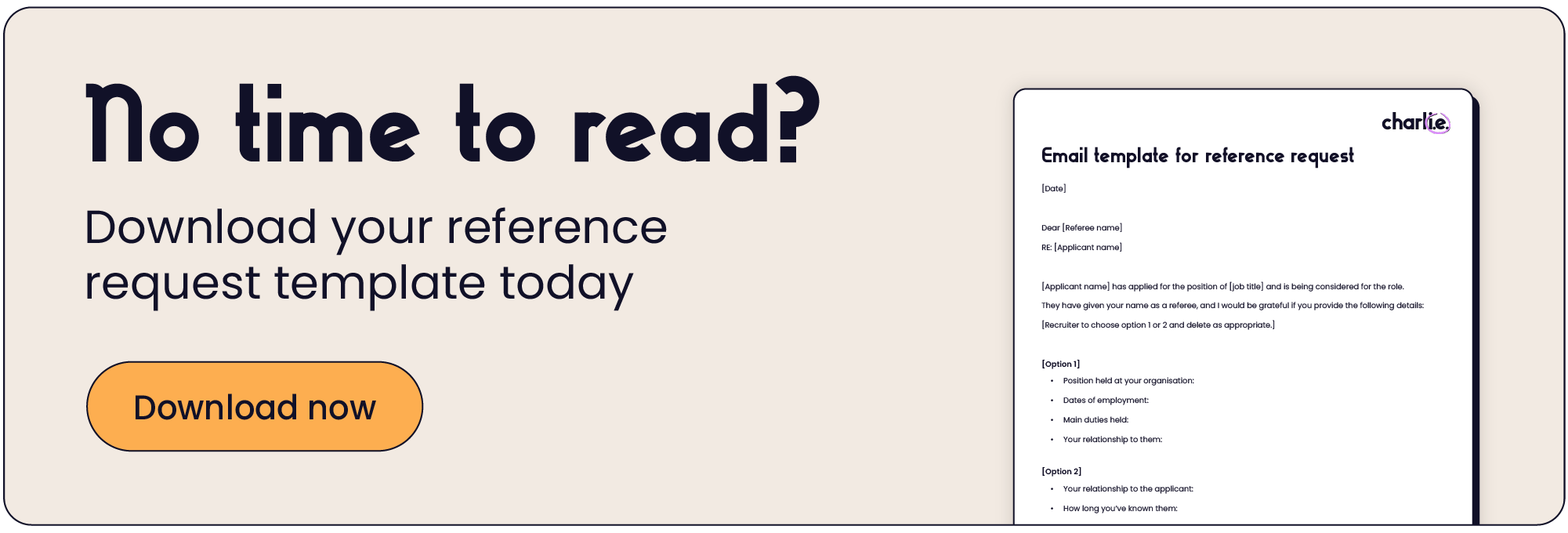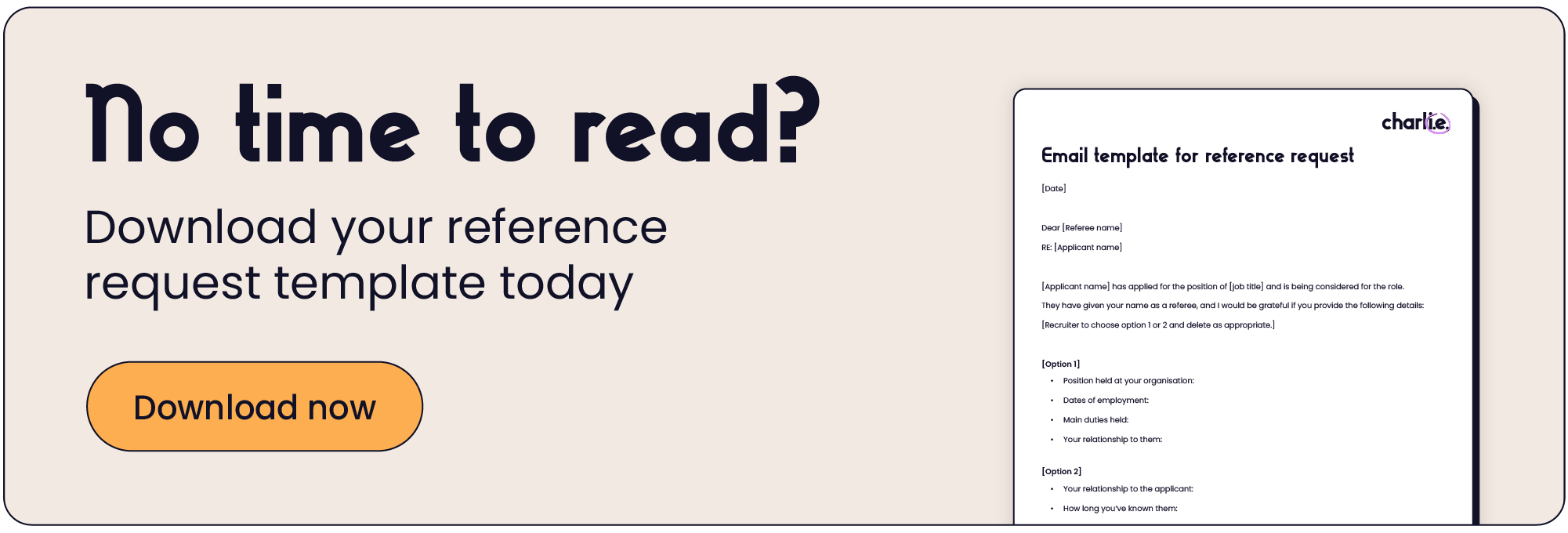How to ask for a reference and respond to reference requests

References are part and parcel of the recruitment process, so at different times you may either be making a reference request or responding to one.
But if you don't come from an HR background, then how do you know what to write in reference letters?
Well, this is the guide to help you out!
Keep reading if you want to:
- know how to respond quickly and professionally to a reference request
- know how to ask another employer to provide you with a reference.
And to make things even easier for you, I’ve included a couple of free and ready-to-use reference templates with this guide.
Below you’ll find a requesting a reference template and a responding to a reference request template.
Both templates will enable you to communicate professionally and effectively during the entire reference request process. And you can download them and use them straight away.
But before we get to the templates, let’s make sure we understand what a reference request is, and what should be included in your response…

What is a reference request?
A prospective employer will send a reference request to the current or former employer of a potential new employee.
References are typically requested by a recruiting employer when they’ve shortlisted a suitable candidate (or candidates) and are preparing the paperwork for their employment.
A reference request asks the referee to:
- confirm the employment information provided by the candidate is true and accurate
- comment on their suitability for a role.
Reference requests are usually sent to current or former managers and colleagues, and should only ask for information that’s relevant and necessary to work or the role.
How to ask for a reference
A reference request can be made by email or phone, but a written request for a reference is probably more common practice.
And the best and easiest way to write a reference request is with a reference request template.
This is because every reference request email you send should include the same standard questions and comply with data protection and discrimination laws. Using an email template for reference requests ensures this and it keeps things consistent.
A phone call is a good option if you are trying to make the choice between two strong candidates — and you can always follow up a written reference with a chat if something requires clarification or further discussion.
However you ask for a reference, to be in line with data protection you need to have permission from the candidate before you approach any of their referees.
How to write a request for reference
Sending a reference request email is much faster and simpler if you have a reference request template saved on file.
A reference request template email already has all the necessary information and questions included. You simply need to review it, add in the personal and role info, and press send. Plus, you can always edit it further to make it more role specific.
Having a reference request email template saved and ready means you don’t have to rethink things every time you’re recruiting, as the hard work’s already been done. And you can feel confident that the final reference request email is professional and properly represents you and your business.
Using a character reference request template also means you’re being consistent every time you recruit, and treating all potential new employees fairly — i.e. every reference request you send contains the same set of questions.
What can you ask in a reference request?
The great thing about using an email template for reference requests is that you don’t have to remember what to include every time you’re hiring — it’s all there in the character reference request template.
But before you send out any reference requests, make sure your candidates are aware that all offers of employment are dependent on references. Avoiding miscommunication around reference gathering is really important, as you’re not allowed to contact someone’s referees without prior consent.
So, what’s included in a reference request?
The best place to start is with questions based around a candidate’s CV. For example:
- When and how long did they work for/with you?
- What was their role?
- In what capacity did you work with them?
Then you have the option to dig deeper and find out what sort of employee and colleague they are. Answers to these questions will tell you whether your impression aligns with the referees’ feedback:
- Would you hire them again?
- What was their biggest accomplishment?
- What was their biggest challenge?
- What are their strengths?
- What about their weaknesses?
- Are they a good communicator?
- Is there anything you want to say about them that might not come across in their CV/in an interview?
Top tip: save all of these questions in your template for reference requests.
In addition to the generic questions above, you might also want to add a few that are role specific. If you’re recruiting for a position with line management responsibilities, for example, then you may want to ask about any previous experience of managing people. And if you recruit for a number of similar roles, it would make sense to have these targeted questions also saved in your reference request template email.
It’s also worth noting that you’re not allowed to ask questions about race, age, religion, sexual orientation, gender or any protected characteristic in a reference request.
How to respond to a reference request
A similar methodology to making a reference request can be used for responding to one, but as all requests are likely to vary, it’s more of a guiding framework than a template.
This is how we approach reference requests at Charlie:
- In good time
Responding promptly to a reference request is not only courteous but good for your professional reputation. Both the employer and the candidate are waiting on you, and potentially other people too, if there’s more than one person in line for the job.
- With an introduction
Even though they’ve contacted you, it's always worth stating who you are and what you do. Especially as your own role may have changed since you worked with a former employee.
- With context
Explain how you know the candidate, and when you worked together and for how long.
- Fairly but honestly
At Charlie, we approach all reference requests fairly and consider our answers carefully. Even if it didn’t go so well with us, we wouldn’t want someone not to get a job, so we neither embellish nor limit. On the odd occasion — gross misconduct, for example — we might feel it’s only fair to the employer to mention something.
- With examples
Real-life scenarios help to better illustrate a point and are better than just listing out someone’s personal and professional qualities.
And if we feel a question in a reference request is unprofessional or inappropriate, we refuse to answer it.
How to respond to a bad reference
A bad reference doesn’t have to mean the end for someone you thought was a potentially great employee, but you will need to take it into consideration somehow.
Asking for two or more referees is good practice, as then you can decide whether a bad reference is just a one off or part of a pattern. If one reference is at odds with the rest, then it’s likely that something else is going on.
And don’t forget you can talk to your candidate. Given the chance to explain, you might see a negative reference in a whole new light.
Of course, if more than one reference is saying a similar thing then you may need to revisit your hiring decision.
Reference request email template
Part of our mission at Charlie is sharing our HR knowledge and expertise with other small businesses.
So here is a free reference request email template that you can use from today. Simply save on file, copy and paste into an email, fill in the blank sections and choose Option 1 or 2.

